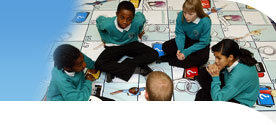



Citizenship develops successful learners who are equipped to play a full part in public life. It gives them the ability to be engaged, critical and willing to take action on topical political and social issues of concern. Pupils are confident to speak out for themselves and for others, and work independently and collaboratively to try to make a difference in their communities and society.
They develop understanding of the key concepts of democracy and justice, which requires them to reflect critically on what is fair and responsible in different situations and the likely impact on the rights and responsibilities of others. Through in-depth research and enquiry learners develop analytical and evaluative skills to ensure their points of view are informed, clear and coherent. They demonstrate understanding and toleration of different views, including those that they may not agree with.
The citizenship curriculum provides opportunities to develop confident learners who have a sense of self-worth and are secure in exploring their identities. Pupils are able to think and act for themselves, and relate to and work with others.
Citizenship provides an environment for pupils to express their ideas and opinions by communicating with real audiences, in school and in the wider community. Pupils engage with others and respond constructively to them and explore their own and others' views, decisions, actions, values and beliefs. By recognising and debating different ideas and issues, pupils learn to respond with confidence, develop logical arguments and justify viewpoints with evidence.
Participation in group discussion and community-based action develops pupils' confidence in dealing with a range of real and difficult issues where there may be competing views or rights. Such activities provide opportunities for pupils to work in groups and teams, trying out different roles and ideas to achieve a common purpose. Pupils take collective responsibility for completing projects and reflect on their own and others' participation in order to improve the quality of their work. Citizenship, then, helps prepare pupils for the challenges and opportunities of both life and work.
Pupils engage with a diverse range of political, social and ethical dilemmas that affect people. They think about issues in new and critical ways.
As they discuss and debate controversial issues pupils gain a sense of empowerment and a willingness to try to make a difference. Activities where they take part individually and collectively in different forms of action engender a sense of responsibility for themselves and others.
Pupils research the impact of different decisions, asking questions and weighing up the consequences of decisions for communities and the environment - all of which contribute to their understanding of what it means to be an informed, active and responsible citizen.
Citizenship enables pupils to consider whether solutions are fair and reasonable or discriminatory and unjust to people from different traditions and backgrounds. This promotes an understanding of shared and diverse values, and allows pupils to learn about and appreciate cultures that are different to their own.